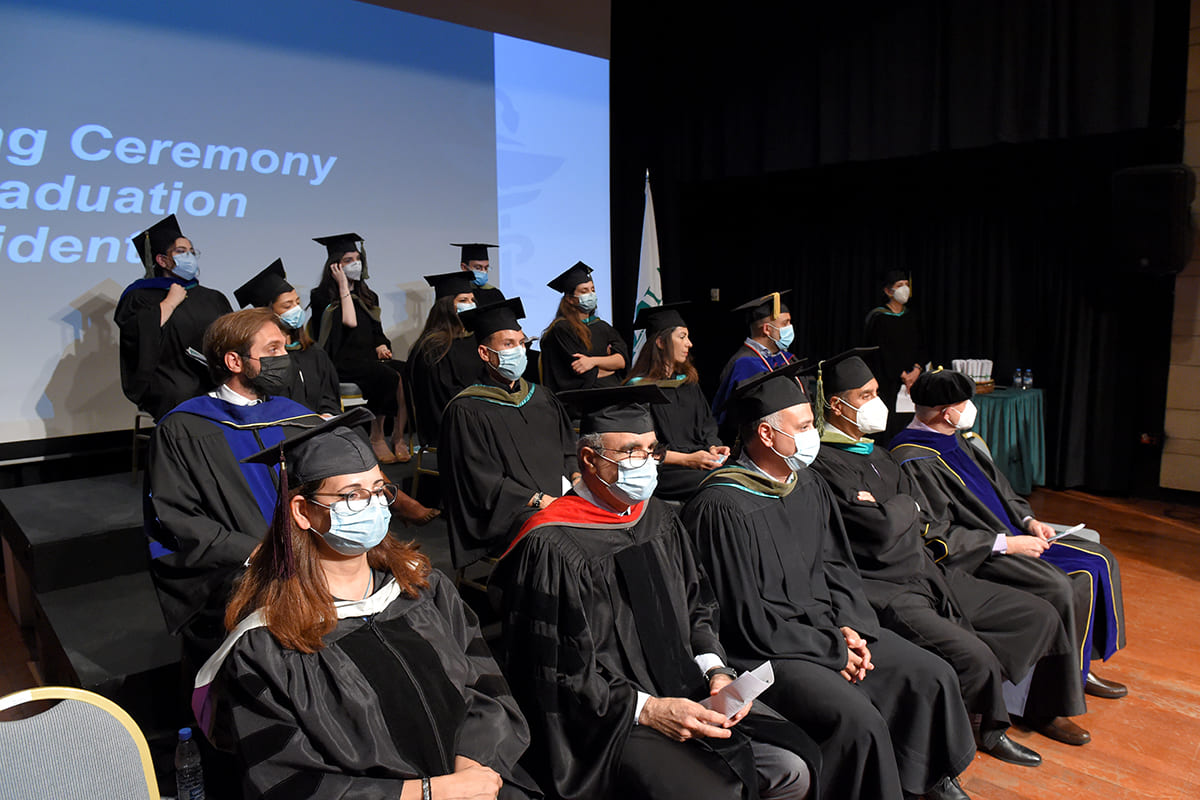LAU PharmD Program Accredited for Another Eight Years
The School of Pharmacy celebrates a well-earned milestone, despite past and prevailing challenging circumstances, attesting to the high caliber of its faculty, staff, students and alumni.
Following a virtual site visit last November, the Doctor of Pharmacy (PharmD) program at the LAU School of Pharmacy (SOP) received continued accreditation from the Accreditation Council for Pharmacy Education (ACPE) until June 2031, which represents the full eight-year cycle between self-studies.
The news was welcomed by LAU President Michel E. Mawad who congratulated the school and Dean Naser Z. Alsharif. “This is a credit to you and to your faculty, which is very well deserved,” he said. Provost George E. Nasr also expressed his gratitude to the school’s constituents for their dedication and his pride in this “renewed quality recognition.”
Since the last accreditation in 2015, “the work never stopped at the school,” said Associate Professor and Associate Dean for Academic Affairs Roy Kanbar. “During the past six-to-eight years, school administrators, faculty and staff integrated the process and requirements of accreditation into their daily functions and committees’ assignments by aligning everything that we do with the high standards we needed to meet.”
Listing the hurdles caused by the pandemic and the ongoing economic crisis, Dr. Kanbar elaborated on the many challenges faculty and students had to overcome. For one example, some learning components of the program had to be delivered virtually, and faculty were quick to adapt the curriculum in the pivot to online learning while preserving its high standards.
As some faculty members were also lost due to the brain drain, those remaining had to shoulder a heavier load. In due course, more faculty were recruited and assigned mentors to help them adjust and ensure continued academic excellence. The lack of resources also disrupted common practices such as providing preceptors with development opportunities. “With the help of fantastic alumni who have gone on to establish successful careers in the US, we were able to build a preceptors’ development plan,” said Dr. Kanbar.
“It has been wonderful to work with and for all the people who have been committed to the school despite all the difficulties,” noted Dr. Alsharif, adding how the accreditation goes to show the “quality of our program and the caliber of our faculty and students.”
One alumna of the program, Dr. Luma Succar, who is currently a senior clinical pharmacy specialist at Houston Methodist Hospital in the US, reflected on her years at LAU. “Through interactive courses, opportunities to give feedback and student representation across the school’s committees, I was able to be actively engaged in my own learning.”
She also pointed to the merits of LAU’s Interprofessional Education that offered her a fully rounded experience enriched by the interaction with other health sciences students. “This opened my eyes to the expectations of the real world, which is reflected in the role I hold today,” she added.
The PharmD program at LAU remains the only ACPE-accredited program outside the US. Thanks to this credential, its alumni have the privilege of taking the US board exam without having to complete the prerequisite internship hours or the foreign equivalency exam required for other international pharmacy students.
Whether in Lebanon or abroad, pharmacy education at LAU is highly valued. The BS, as well as the PharmD, unlock numerous career paths in pharmacies, healthcare facilities, pharmaceutical companies, consultancy firms, research centers and academic institutions.
For Dr. Succar, one of the most valuable aspects of the program has been the scientific and critical thinking at the core of coursework and experiential activities. “This particular skillset allowed me to build and integrate knowledge while challenging me to question, identify issues, consider possibilities, and address problems effectively. This way of thinking is essential to pharmacy practice and paves the way to success regardless of how one chooses to apply their PharmD degree in their professional life,” she explained.
Looking to the future, Dr. Alsharif hopes to preserve the momentum of the reaccreditation, “because it is not just about the cycle of accreditation – it is about building on the quality and the spirit with which this milestone was achieved.”
